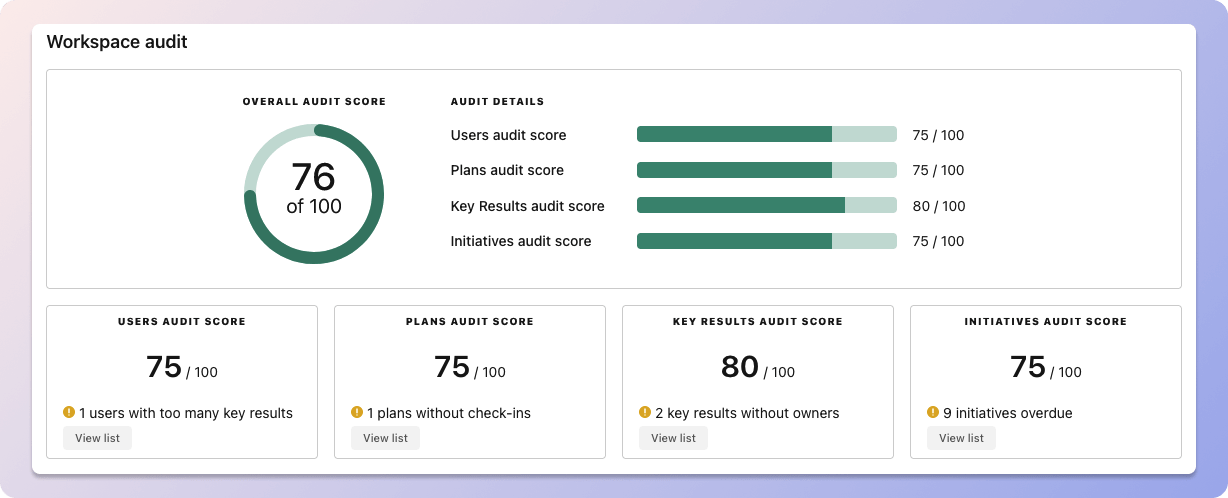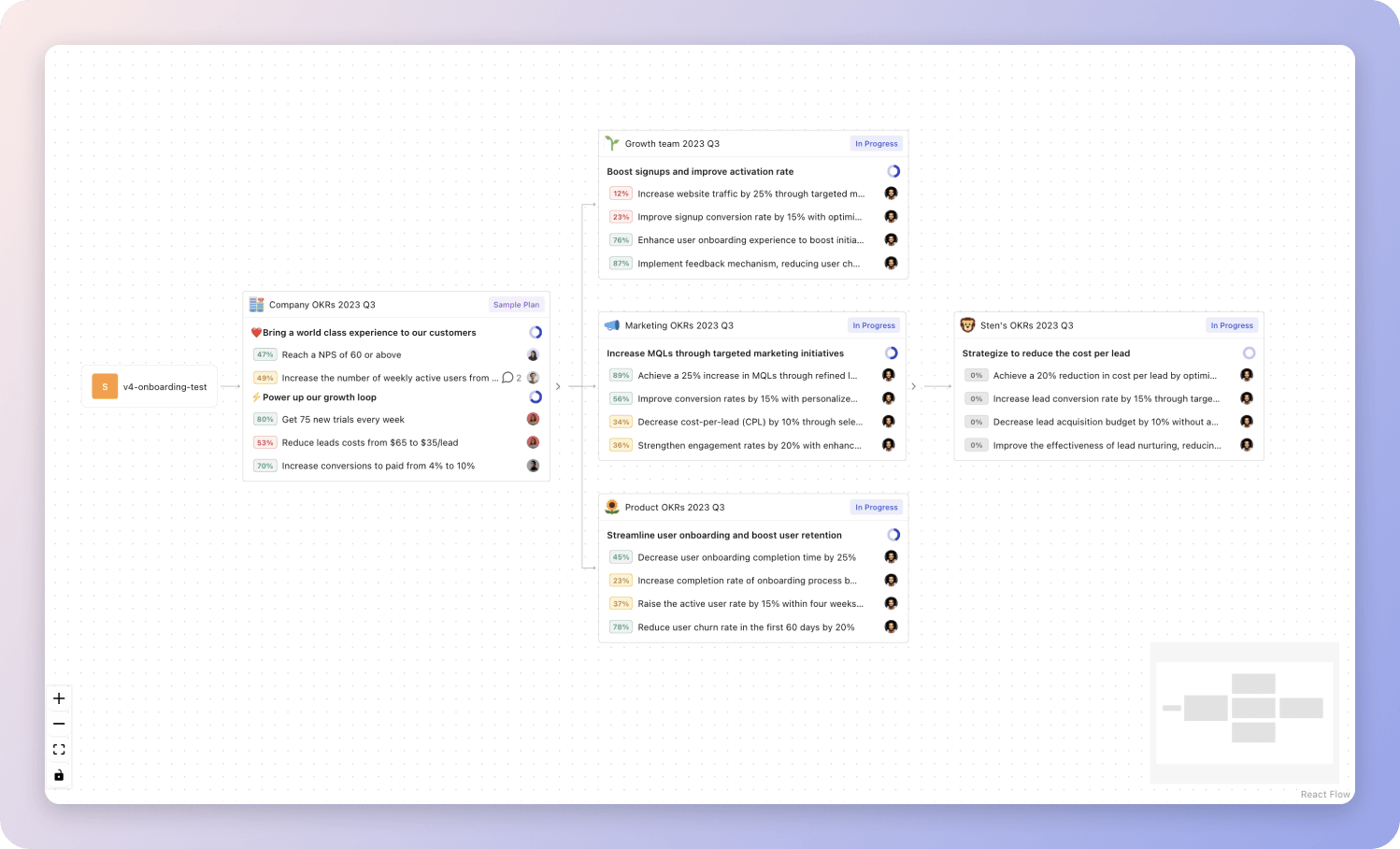2 OKR examples for Market Analysis Team
What are Market Analysis Team OKRs?
The Objective and Key Results (OKR) framework is a simple goal-setting methodology that was introduced at Intel by Andy Grove in the 70s. It became popular after John Doerr introduced it to Google in the 90s, and it's now used by teams of all sizes to set and track ambitious goals at scale.
How you write your OKRs can make a huge difference on the impact that your team will have at the end of the quarter. But, it's not always easy to write a quarterly plan that focuses on outcomes instead of projects.
That's why we have created a list of OKRs examples for Market Analysis Team to help. You can use any of the templates below as a starting point to write your own goals.
If you want to learn more about the framework, you can read more about the OKR meaning online.
Best practices for managing your Market Analysis Team OKRs
Generally speaking, your objectives should be ambitious yet achievable, and your key results should be measurable and time-bound (using the SMART framework can be helpful). It is also recommended to list strategic initiatives under your key results, as it'll help you avoid the common mistake of listing projects in your KRs.
Here are a couple of best practices extracted from our OKR implementation guide 👇
Tip #1: Limit the number of key results
Having too many OKRs is the #1 mistake that teams make when adopting the framework. The problem with tracking too many competing goals is that it will be hard for your team to know what really matters.
We recommend having 3-4 objectives, and 3-4 key results per objective. A platform like Tability can run audits on your data to help you identify the plans that have too many goals.
 Tability's audit dashboard will highlight opportunities to improve OKRs
Tability's audit dashboard will highlight opportunities to improve OKRsTip #2: Commit to the weekly check-ins
Setting good goals can be challenging, but without regular check-ins, your team will struggle to make progress. We recommend that you track your OKRs weekly to get the full benefits from the framework.
Being able to see trends for your key results will also keep yourself honest.
 Tability's check-ins will save you hours and increase transparency
Tability's check-ins will save you hours and increase transparencyTip #3: No more than 2 yellow statuses in a row
Yes, this is another tip for goal-tracking instead of goal-setting (but you'll get plenty of OKR examples below). But, once you have your goals defined, it will be your ability to keep the right sense of urgency that will make the difference.
As a rule of thumb, it's best to avoid having more than 2 yellow/at risk statuses in a row.
Make a call on the 3rd update. You should be either back on track, or off track. This sounds harsh but it's the best way to signal risks early enough to fix things.
Building your own Market Analysis Team OKRs with AI
While we have some examples below, it's likely that you'll have specific scenarios that aren't covered here. There are 2 options available to you.
- Use our free OKRs generator
- Use Tability, a complete platform to set and track OKRs and initiatives
- including a GPT-4 powered goal generator
Best way to track your Market Analysis Team OKRs
Your quarterly OKRs should be tracked weekly in order to get all the benefits of the OKRs framework. Reviewing progress periodically has several advantages:
- It brings the goals back to the top of the mind
- It will highlight poorly set OKRs
- It will surface execution risks
- It improves transparency and accountability
Spreadsheets are enough to get started. Then, once you need to scale you can use a proper OKR platform to make things easier.
 Tability's Strategy Map makes it easy to see all your org's OKRs
Tability's Strategy Map makes it easy to see all your org's OKRsIf you're not yet set on a tool, you can check out the 5 best OKR tracking templates guide to find the best way to monitor progress during the quarter.
Market Analysis Team OKRs templates
We've covered most of the things that you need to know about setting good OKRs and tracking them effectively. It's now time to give you a series of templates that you can use for inspiration!
You will find in the next section many different Market Analysis Team Objectives and Key Results. We've included strategic initiatives in our templates to give you a better idea of the different between the key results (how we measure progress), and the initiatives (what we do to achieve the results).
Hope you'll find this helpful!
OKRs to conduct comprehensive market intelligence on competitors
Conduct comprehensive market intelligence on competitors
Analyze 10 competitors' product and service offerings
Identify 10 competitors in the market
Perform a detailed analysis comparing competitors' offerings
Research and list each competitor's products and services
Identify at least 20 key competitors in the market
List all known competitors in your business sector
Research unknown competitors through market analysis
Compile a list of 20 main competitors
Understand the marketing strategies of at least 12 competitors
Identify 12 key competitors in your business sector
Gather data on each competitor's marketing approach
Analyze and contrast each competitor's marketing strategies
Document and interpret 15 competitors' pricing strategies
Obtain detailed information on each competitor's pricing strategy
Analyze and interpret obtained pricing data
Identify and list 15 primary competitors in the market
OKRs to decrease user acquisition cost for our mobile app
Decrease user acquisition cost for our mobile app
Improve advertisement click-through rate by 15% with targeted marketing campaigns
Monitor, analyze, and optimize campaign performance regularly
Implement targeted ad campaigns based on identified personas
Research customer behavior to create detailed audience personas
Reduce average acquisition cost per user by 25%
Increase targeting precision in ad campaigns
Analyze and optimize current marketing strategies
Enhance the retention strategies for existing customers
Increase organic app downloads by 30% through app store optimization
Promotion through positive user reviews and ratings
Develop compelling app descriptions and attractive icons
Conduct keyword research to improve app store search ranking
More Market Analysis Team OKR templates
We have more templates to help you draft your team goals and OKRs.
OKRs to boost customer base and broaden our market influence
OKRs to boost audience loyalty and brand affiliation
OKRs to achieve proficiency in full-stack development with nestjs, React, and dynamodb
OKRs to improve overall customer satisfaction in sales operations
OKRs to elevate the quality and impact of design solutions
OKRs to identify and address all existing compliance gaps
OKRs resources
Here are a list of resources to help you adopt the Objectives and Key Results framework.
- To learn: Complete 2024 OKR cheat sheet
- Blog posts: ODT Blog
- Success metrics: KPIs examples